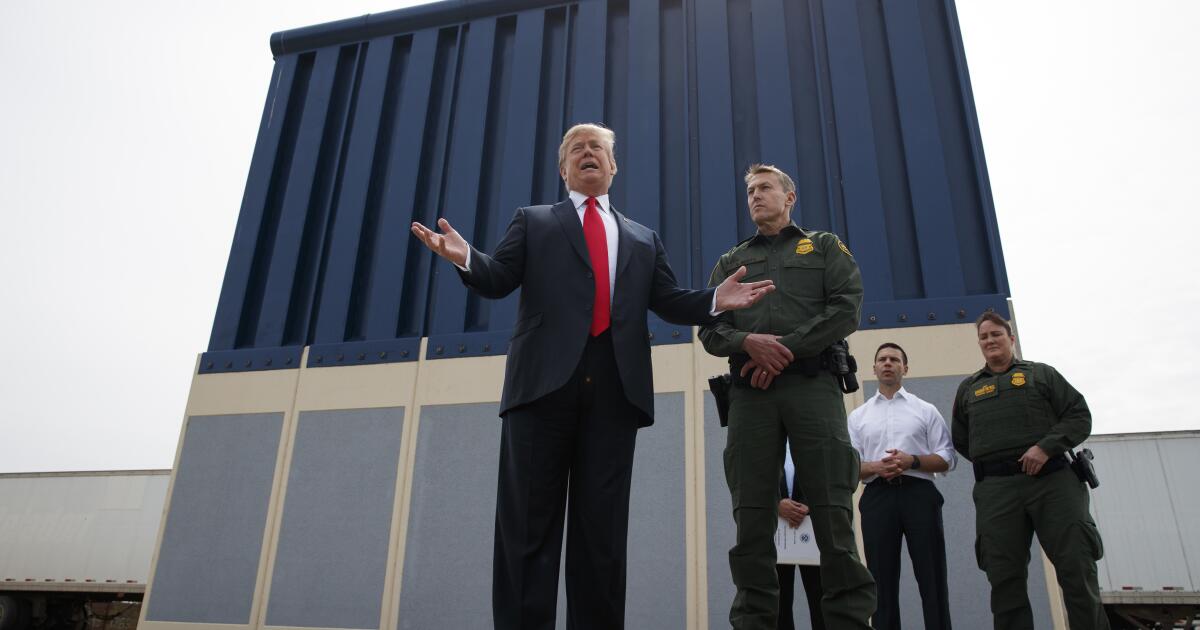Trump confirms that the deportation strategy will involve the military

WASHINGTON — President-elect Donald Trump’s plan to deport large numbers of illegal immigrants to the US will involve the military and a national emergency declaration, he confirmed on Monday.
In a November 8 post on Trump’s social media site Truth Social, Tom Fitton, who heads the conservative legal group Judicial Watch, wrote: “GOOD NEWS: Reports are the incoming @RealDonaldTrump administration is ready to declare a national emergency and will use military equipment. to push back on Biden’s attack on the mass deportation plan. ”
Trump responded early Monday: “TRUE!!!”
Asked about other details of the plan, Trump’s immigration spokeswoman, Caroline Leavitt, said in a statement that “President Trump will use all federal and state powers necessary to begin the largest deportation of illegal criminals, drug traffickers and human traffickers in American history.”
Immigrant advocates, including the American Civil Liberties Union, say they are ready to respond with legal action.
Aaron Reichlin-Melnick, senior fellow at the left-leaning American Immigration Council, warned that no national emergency authority would allow the US to deport.
In his first term, Trump bypassed Congress to divert Pentagon funds to expand the border wall by declaring a national emergency. President Biden lifted the emergency order shortly after taking office in 2021.
Reichlin-Melnick said she does not take Trump’s response to Fitton’s position as a guarantee that US troops will be sent to deport him. In the past, the military was used to provide assistance at the border, but was not directly involved in rounding up migrants.
“This is my reminder of the last four years of the Trump administration – they say a lot of things and when the actual policy comes out, it usually looks very different,” he said.
More broadly, Trump and his allies have included discussions of newly arrived immigrants and the broader population of undocumented immigrants, Reichlin-Melnick said.
One potential drawback to Trump’s mass deportation plan: Anyone released by US border authorities within the past four years already faces removal charges and cannot be removed until that process, which often takes years, is completed. As of last month, immigration courts had a record 1.5 million asylum cases.
Deportation would also target immigrants who entered the country long before Biden took office.
“They often suggest that really all they’re talking about is criminals and newcomers and that’s a small percentage of the undocumented population,” Reichlin-Melnick said.
Mass deportations were one of Trump’s big campaign promises — he said he would go after at least 15 million people in the US illegally, though the number of undocumented immigrants is likely to be lower. During his last presidency, Trump deported about 1.5 million immigrants, according to the Migration Policy Institute’s analysis of government statistics, which the Biden administration supports.
Finding, detaining and deporting many people can be challenging and challenging. On the campaign trail, Trump said his strategy would rely on the military, a friendly country and local law enforcement and military power.
The ACLU Foundation of Southern California on Monday filed a lawsuit against US Immigration and Customs Enforcement seeking records that would reveal that the agency’s Air Operations – its network of for-profit, commercial and private planes that are recognized for deportation – could be expanded to include dozens. deportation order. The lawsuit alleges that the secrecy surrounding the agency’s airline operations “hidden responsibility for serious abuses and accidents” on the planes.
Trump has chosen Tom Homan, formerly acting director of US Immigration and Customs Enforcement, to oversee deportations as his “border chief”. Homan has promised to resume immigration raids at workplaces and prioritize immigrants who pose a threat to public safety and national security for deportation.
Trump also appointed South Dakota Gov. Kristi Noem, who has little experience with the Department of Homeland Security, to lead the agency. Longtime Trump adviser Stephen Miller, who was behind many of his first-term immigration initiatives, will continue to play a role as deputy policy chief.
Homan said the administration will deport people who have been granted final deportation orders by immigration judges. In fiscal year 2023, immigration agents removed 142,580 of the nearly 1.3 million people under those orders, according to federal statistics.
CNN’s Jake Tapper asked House Speaker Mike Johnson on Sunday whether the American people are ready for the economic disruption that will cause millions of lives, and the images that lead to the breakdown of families. Experts have predicted that mass deportations will shock workers in all key industries, including construction and agriculture, raise grocery prices, and cause economic hardship for children of US citizens and other breadwinners.
“I’m not sure that’s what’s going to happen, Jake,” Johnson replied. “I think what the president is talking about is the dangerous people we know exist. … So you start with that number, you get by counting something up to 3 or 4 million people that fit that category.”
There were 662,566 people with pending criminal charges or deportations from US Immigration and Customs Enforcement as of July 21, according to a letter to Rep. Tony Gonzales (R-Texas) from Patrick Lechleitner, the agency’s acting director. Some have been on the list for decades because their country of citizenship will not allow the US to deport them. Some are still serving jail or prison terms for their crimes.
Tapper said Trump’s promise wasn’t just to get rid of criminals — it was to get rid of all undocumented immigrants.
“I’m not sure what the exact offer is,” Johnson replied. “I know the president has said he wants to engage in the largest deportation effort in history, because that’s what needs to be done.”
Source link



